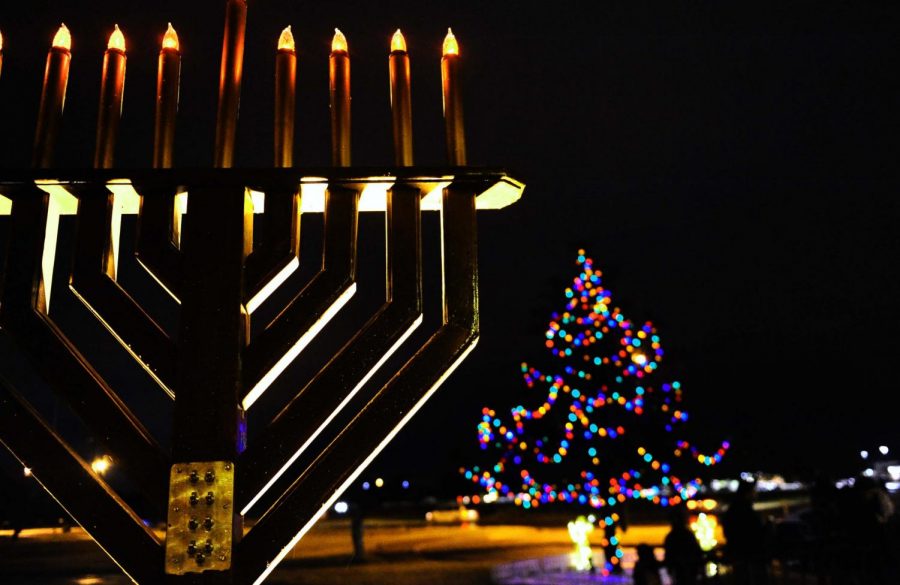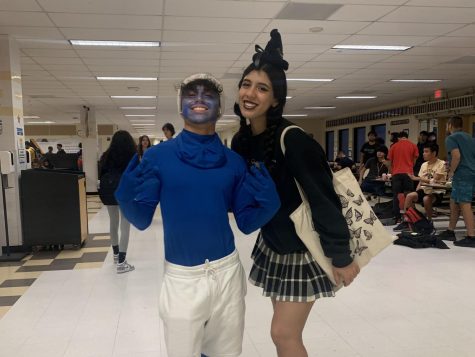Hanukkah, Christmas blend family celebrations
Dominique Washington, Dyess Air Force Base
Dyess Air Force Base in Taylor County, Texas displays a menorah and Christmas tree for the holidays in 2009.
In recent years, Nov. 1 is basically the first day of Christmas. Eager families pack away Halloween decorations just to rush out the Christmas lights or Christmas trees, Menorahs, wreaths and more for the holiday season. Society way over-hypes the holiday season, with Christmas leading the festivities.
The average American will spend about $700 on holiday gifts this year, totaling more than $465 billion and estimated by the National Retail Federation, ABC News reported. Though most of it goes to the Christmas hype, other religious holidays such as Hanukkah, Three Kings Day and Kwanzaa pull in a flow of income and presence in society. In South Florida, a very Jewish community, Hanukkah celebrations are common.
In such a diverse community, many South Floridians celebrate both Hanukkah and Christmas because of religious differences in parents. While the divide between the actual holidays and religions may not be vast, the way they are celebrated is. Christmas is an occasion of lights, festivity, parties and “Santa,” while Hanukkah is a calmer celebration, involving family and tradition, as well as looking back on the history of the holiday.
Sophomore Jenna Williams is an atheist, though her mother is Jewish and her father Christian. Though she really doesn’t celebrate either, she feels conflicted about which to celebrate or claim as her identity.
“It’s definitely been different growing up with [two religions] because my dad always wanted a Christmas tree and my mom always wanted a Menorah, but my mother just hates decorating in general, so we never really do any of that. At the office [Williams and Associates, her father’s business] it’s always a mix of both, but growing up my eyes were open to both,” Williams.
Sophomore Kaylinn Escobar, a Roman Catholic, celebrates Christmas and Novena, which is a Colombian religious holiday. She is relatively religious, and finds comfort in prayer and church. In response to the prominence of Christmas celebrations, she has a few opinions.
“Christmas is really popular, but I think that’s just because it’s the most commercialized holiday. You don’t see a lot of Chanukah-themed sweaters or Kwanza candies casually. I think the only reason it’s more ‘popular’ is because it’s more accessible, at least where I live,” Escobar said.
This is a common theme for most Christian people–that the popularity of Christmas overshadows Judaism and other small religions with holidays during this season.
Abbie Kopelowitz, who is Jewish and very involved in her Temple, had a similar point of view. She jokingly made a comment on the lack of Hanukkah movies in relation to number of Christmas movies, though she has enjoyed her fair share of all religious/holiday movies.
“I love Christmas and celebrating with all my friends. I personally own [two] Christmas sweaters, but Christmas is the most popular of the holidays. Most people are Christian [or Catholic], so Santa is coming to town,” Koplewitz joked.










Susan Forst • Dec 13, 2017 at 6:07 pm
great article and really touched a lot of my personal feelings this holiday season. nice to see all the holidays recognized!